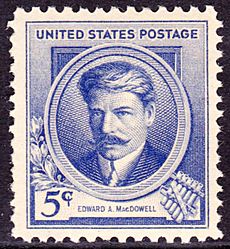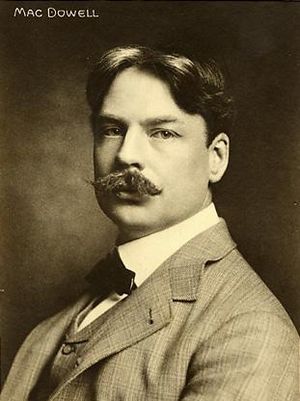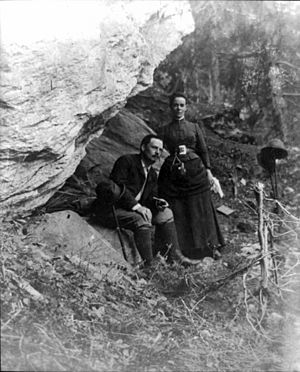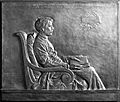Edward MacDowell facts for kids
Edward Alexander MacDowell (born December 18, 1860 – died January 23, 1908) was an American composer and pianist. He lived during the late Romantic period of music. He is most famous for his second piano concerto. He also wrote beautiful piano pieces like Woodland Sketches, Sea Pieces, and New England Idylls. His most popular short piece, "To a Wild Rose", is found in Woodland Sketches. In 1904, he was one of the first seven Americans to join the American Academy of Arts and Letters.
Contents
Early Life and Music Studies
Edward MacDowell was born in New York City. His father, Thomas MacDowell, was a milk dealer. Edward's first piano teacher was Juan Buitrago, a violinist from Colombia. He also learned from other musicians living with his family. These included Pablo Desverine from Cuba and Teresa Carreño from Venezuela.
Edward's mother took him to Paris, France, in 1877. He got a special scholarship to study at the Paris Conservatory. He was a top student there for two years.
After Paris, he went to Dr. Hoch's Conservatory in Frankfurt, Germany. He studied piano with Carl Heymann and learned how to compose music with Joachim Raff. Famous musicians like Franz Liszt and Clara Schumann visited the school. MacDowell even played some of his own music for Liszt. Liszt liked MacDowell's music and helped him get it published.
After finishing his studies in 1881, MacDowell stayed in Germany. He composed music, performed concerts, and taught piano. He taught in places like Darmstadt and Wiesbaden for several years.
Marriage and Family Life
In 1884, MacDowell married Marian Griswold Nevins. Marian had been one of his piano students in Frankfurt. They loved each other very much. Marian later became ill, and they were not able to have children.
Music Career and Teaching
In Germany, the MacDowells lived in Frankfurt, Darmstadt, and Wiesbaden. From 1885 to 1888, Edward focused mainly on writing music. This made money tight, so he decided to move back to the United States in 1888.
He settled in Boston and became a well-known concert pianist and piano teacher. He performed with the Boston Symphony Orchestra and other music groups.
In 1896, MacDowell became a music professor at Columbia University in New York. He was the first music professor in the university's history! He was asked to create a music department there. He stayed at Columbia until 1904. Besides composing and teaching, he also led the Mendelssohn Glee Club from 1896 to 1898. He even wrote music for them to perform.
In 1896, Marian MacDowell bought Hillcrest Farm in Peterborough, New Hampshire. This became their summer home. Edward loved the peaceful countryside. It helped him feel creative and write more music. He composed two piano concertos, two orchestral suites, and many piano pieces and songs. He also wrote some pieces using the name Edgar Thorn.
MacDowell was also a great teacher of piano and music composition. Many students learned from him.
Edward MacDowell faced a lot of stress at Columbia University. He had disagreements with the university president about how music should be taught. In 1904, he decided to resign from his job.
After leaving Columbia, MacDowell became very sad, and his health got worse quickly. He had suffered from seasonal affective disorder throughout his life. He also had an accident in 1904 when he was hit by a horse-drawn cab. This may have made his health problems worse.
In his final years, his mind became like that of a small child. He would sit quietly, smiling, and looking at books of fairy tales. Friends and the Mendelssohn Glee Club helped raise money for his care.

Marian MacDowell took care of her husband until he passed away. In 1907, they started MacDowell (artists' residency and workshop) (originally called The MacDowell Colony). They gave their Hillcrest Farm to this new organization. Edward MacDowell died in 1908 in New York City. He was buried at his beloved Hillcrest Farm.
Legacy and Honors
In 1896, Princeton University gave MacDowell an honorary degree for his music. In 1904, he was one of the first seven people chosen for the American Academy of Arts and Letters. After this, the MacDowells dreamed of creating a place where artists could live and work.
The MacDowell (artists' residency and workshop) is a special place for artists of all kinds. It helps keep the composer's memory alive by supporting other artists. Marian MacDowell led the MacDowell Colony for over 25 years. She raised money by performing piano concerts and getting help from women's clubs.
The MacDowell Association has supported many famous American composers. These include Aaron Copland, Leonard Bernstein, and Amy Beach. They received help like residencies and awards.
After his death, MacDowell was seen as a very important American composer. In 1940, he was honored on a United States postage stamp. However, over time, other American composers became more famous. Some critics felt his music looked to the past, not the future.
But the beautiful romantic style of music never truly went away. In the 21st century, people started to appreciate MacDowell's music again. On February 14, 2000, he was inducted into the Classical Music Hall of Fame. His two piano concertos are now seen as very important works by an American composer. His sonatas and other piano pieces are still performed and recorded today.
Selected Works
Edward MacDowell wrote many pieces for piano, orchestra, and voice. Here are some of his well-known works:
- Piano Concertos:
- Op. 15 Piano Concerto No. 1 (1885)
- Op. 23 Piano Concerto No. 2 (1890)
- Piano Suites and Sonatas:
- Op. 10 First Modern Suite (1883)
- Op. 14 Second Modern Suite (1883)
- Op. 45 Sonata Tragica (1893)
- Op. 50 Sonata Eroica (1895)
- Op. 51 Woodland Sketches (1896) - Includes "To a Wild Rose"
- Op. 55 Sea Pieces (1898)
- Op. 57 Third Sonata (1900)
- Op. 59 Fourth Sonata (1901)
- Op. 61 Fireside Tales (1902)
- Op. 62 New England Idylls (1902)
- Orchestral Works:
- Op. 22 Hamlet and Ophelia (1885)
- Op. 42 First Suite (1891–1893)
- Op. 48 Second ("Indian") Suite (1897)
- Songs:
- Op. 26 From an Old Garden, for voice and piano (1887)
- Op. 40 Six Love Songs, for voice and piano (1890)
Selected Recordings
- Piano Concerto No. 2: Van Cliburn, Chicago Symphony Orchestra, Walter Hendl (1960)
- Piano Concerto No. 1 and Piano Concerto No. 2: Donna Amato, London Philharmonic Orchestra, Paul Freeman (1985)
- Woodland Sketches, Op.51, Sea Pieces, Op.55, Fireside Tales, Op.61, New England Idyls, Op.62: James Barbagallo (1993)
- Piano Music by Edward MacDowell, Sandra Carlock, pianist (2005)
Images for kids
See also
 In Spanish: Edward MacDowell para niños
In Spanish: Edward MacDowell para niños
- New Hampshire Historical Marker No. 206: The MacDowell Graves
 | Bayard Rustin |
 | Jeannette Carter |
 | Jeremiah A. Brown |




